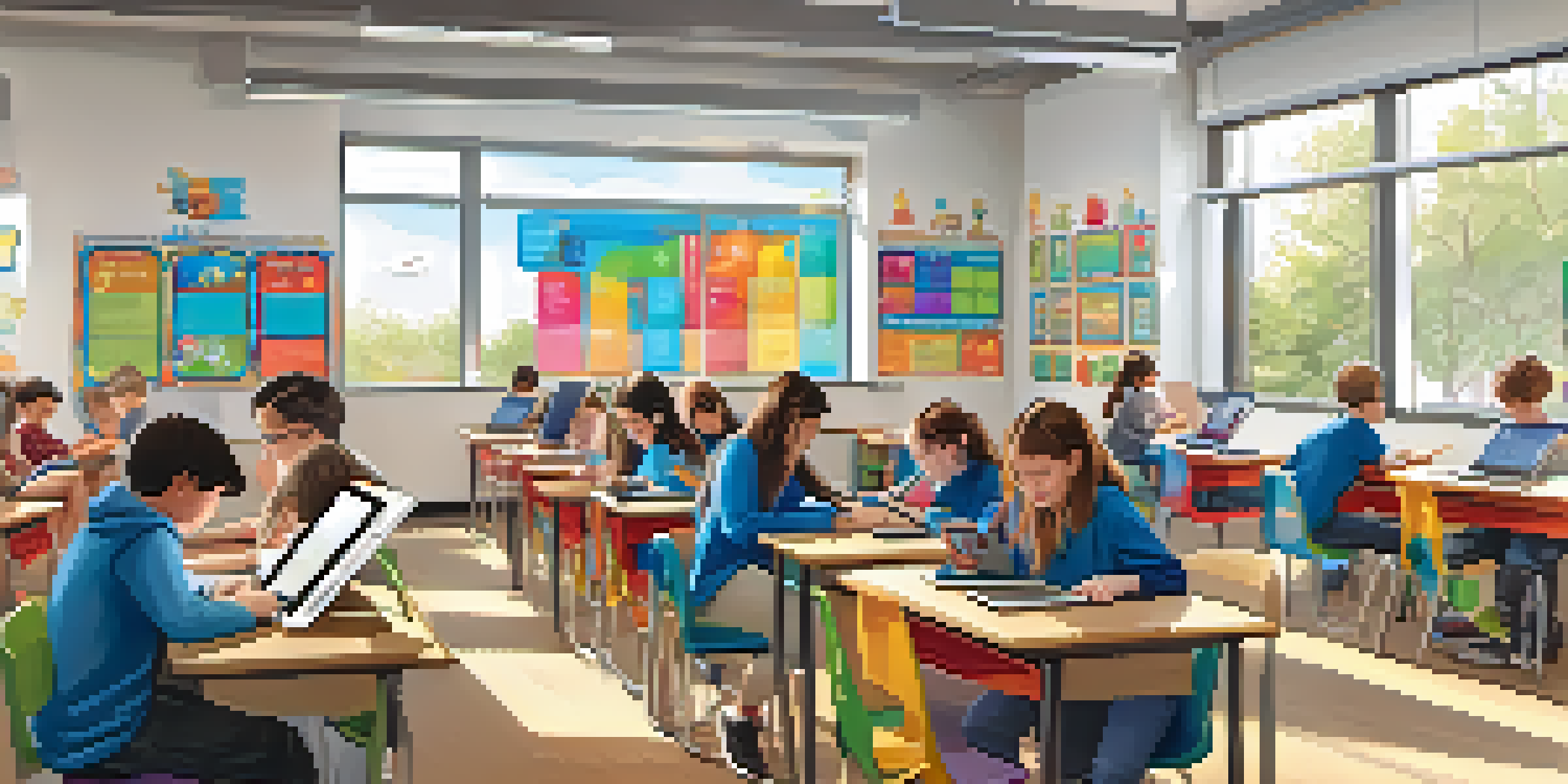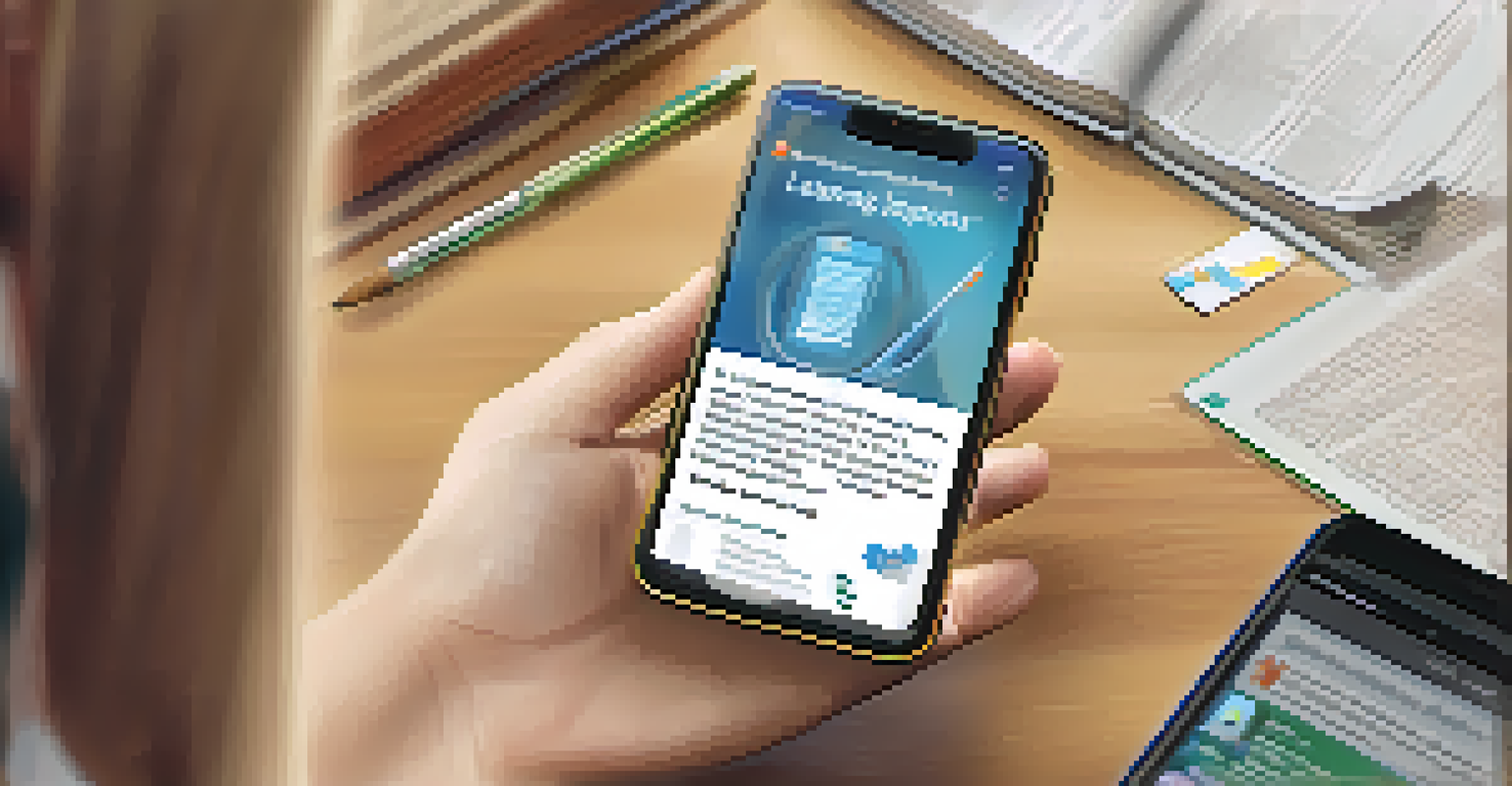How Technology Transforms Adaptive Learning Methodologies

Understanding Adaptive Learning: A Brief Overview
Adaptive learning is an educational approach that personalizes learning experiences based on individual needs. By analyzing student performance and preferences, it tailors the content to ensure efficient learning paths. This method contrasts with traditional learning, where one-size-fits-all solutions often overlook unique student requirements.
Education is the most powerful weapon which you can use to change the world.
Imagine a classroom where each student has a custom roadmap, adjusting in real time according to their understanding. This approach not only enhances engagement but also helps learners grasp concepts at their own pace. As a result, students feel more empowered and motivated to achieve their personal learning goals.
With the rise of technology, adaptive learning has evolved from a theoretical concept into a practical reality. Today, tools like learning management systems and AI algorithms can effectively facilitate this personalized approach, making education more accessible and effective for diverse learners.
The Role of Artificial Intelligence in Adaptive Learning
Artificial Intelligence (AI) plays a pivotal role in enhancing adaptive learning methodologies. By analyzing vast amounts of data, AI can identify patterns in student behavior, pinpointing areas where they struggle or excel. This capability allows for a level of customization that was previously unimaginable in traditional educational settings.

For instance, AI-driven platforms can adjust the difficulty of quizzes based on a student's past performance, ensuring that they are neither bored by overly simple tasks nor overwhelmed by challenging ones. This dynamic adjustment helps maintain engagement and encourages continuous progress.
Personalized Learning Experiences
Adaptive learning customizes educational content to meet individual student needs, enhancing engagement and motivation.
Moreover, AI can provide instant feedback, allowing learners to understand their mistakes and correct them in real time. This immediate response not only reinforces learning but also builds confidence, creating a supportive environment where students feel safe to explore and make errors.
Data Analytics: Driving Insights for Personalized Learning
Data analytics serves as the backbone of adaptive learning, offering insights that help educators tailor their instruction. By collecting and analyzing data from student interactions, educators can gain a clearer picture of individual learning journeys. This information is invaluable for creating personalized learning experiences that cater to each student's unique needs.
The future of learning is not about the tools; it’s about the people, and how we learn together.
For example, learning platforms can track engagement levels, completion rates, and even emotional responses to certain content. This data can then inform instructional strategies, ensuring that educators can adjust their approaches to maximize student success. It's like having a personal coach who constantly evaluates your performance and adapts your training plan accordingly.
Furthermore, data analytics allows for ongoing assessment of learning outcomes. Educators can identify trends over time, making necessary adjustments not only for individual students but for the entire learning program, fostering a culture of continuous improvement.
Interactive Technologies Enhancing Engagement
Interactive technologies, such as virtual reality (VR) and gamification, significantly enhance adaptive learning experiences. These tools create immersive environments that engage students in ways traditional methods cannot. For instance, VR can transport learners to historical events or complex scientific scenarios, making abstract concepts tangible and relatable.
Gamification, on the other hand, incorporates game-like elements into learning, such as points, levels, and rewards. This approach motivates students to participate actively in their learning journey, transforming tasks into fun challenges. It's akin to leveling up in a video game, where each achievement encourages players to keep going.
AI's Role in Education
Artificial Intelligence analyzes student data to provide real-time feedback and tailored learning paths, improving overall outcomes.
By integrating these interactive technologies, educators can cater to various learning styles and preferences, ensuring that all students have the opportunity to thrive. This not only boosts engagement but also fosters a deeper understanding of the material, leading to improved academic outcomes.
The Importance of Mobile Learning in Adaptive Education
Mobile learning has revolutionized access to education, making adaptive learning methodologies more flexible and convenient. With smartphones and tablets, students can learn anytime and anywhere, allowing them to fit education into their busy lives. This accessibility is particularly beneficial for learners who may struggle to attend traditional classes.
For example, a student can review personalized learning modules during a commute or while waiting in line, turning downtime into productive study time. This flexibility empowers learners to take control of their educational journeys, ensuring that they can engage with content at their own pace.
Moreover, mobile learning platforms often incorporate features like push notifications and reminders, helping students stay on track with their learning goals. This blend of convenience and personalized content creates a dynamic learning experience that adapts to the needs of each individual.
Collaborative Learning: A Social Component of Adaptivity
While adaptive learning often focuses on individual needs, incorporating collaborative elements can enhance the experience even further. Group projects and discussions provide opportunities for students to learn from one another, fostering a sense of community. This social aspect can be particularly beneficial for learners who thrive in collaborative environments.
For instance, online discussion boards can be integrated into adaptive learning platforms, allowing students to share insights and questions. This interaction not only enriches their understanding but also helps build essential communication skills. It's like having a study group that adapts to everyone's learning styles and paces.
Mobile Learning Flexibility
Mobile learning allows students to access personalized educational content anytime and anywhere, fitting their studies into busy lives.
Additionally, collaboration can lead to a deeper engagement with the material. By tackling challenges together, students can develop critical thinking skills and gain diverse perspectives on topics, enhancing their overall learning experience. This blend of individuality and collaboration is key to a holistic approach to education.
Future Trends: The Next Frontier in Adaptive Learning
As technology continues to advance, the future of adaptive learning looks promising. Innovations like machine learning and natural language processing are poised to make these methodologies even more effective. For example, machine learning can refine algorithms to predict student needs with greater accuracy, ensuring timely interventions.
Moreover, the integration of wearables and IoT devices could provide real-time data on student engagement and emotional states. This information would enable educators to tailor their approaches instantly, creating a responsive learning environment. Imagine a classroom where the technology can sense when a student is frustrated and adapt the lesson accordingly!

Ultimately, the next frontier in adaptive learning will focus on creating an even more personalized, engaging, and inclusive educational experience. By leveraging emerging technologies, educators can ensure that students not only learn effectively but also enjoy the journey of education.